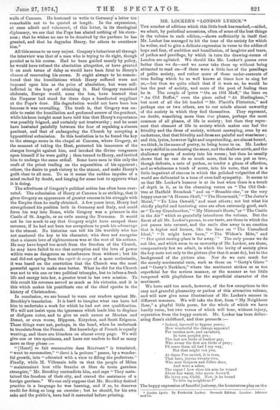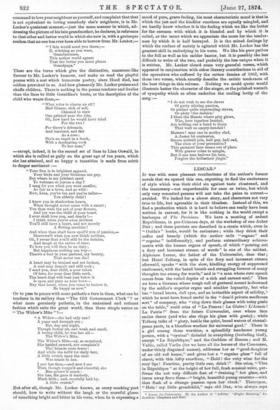MR. LOCKER'S "LONDON LYRICS."'
TEE number of editions which this little book has reached,—aided, we admit, by periodical accessions, often of some of the best things in the volume to each edition,—shows sufficiently in itself that Mr. Locker has managed to hit the tone of the society for which he writes, and to give a delicate expression in verse to the eddies of hope and fear, of ambition and humiliation, of laughter and tears, of pathos and persiflage, by which in turn the drawing-rooms of London are agitated. We should like Mr. Locker's poems even better than we do—and we never take them up without being attracted to read on—if there were a little less of the persiflage of polite society, and rather more of those under-currents of true feeling which he so well knows at times how to sing for us,—but then we quite admit that if it were so, he would be less the poet of society, and more of the poet of feeling than he is. The couple of lyrics " On an Old Muff," the lines on " An Old Buffer," even the piece called " At Hurlingham," but most of all the bit beaded " Mr. Placid's Flirtation," and perhaps one or two others, are to our minds almost unworthy of the society in which they find themselves. They represent, no doubt, something more than true phases, perhaps the most common of all phases, of life in society ; but then they repre- sent that element of life in society which makes one feel the frivolity and the dross of society, without conveying, even by an undertone, that that frivolity and dross are painful and wearisome ; and this, lyrics, however light and unpretending, are almost bound, we think, in the name of poetry, to bring home to us. Mr. Locker is very skilful in condensing the sneer, and the shallow mirth, and the shallower regrets of society into his verses ; but then he usually shows that he can do so much more, that he can put so true, though delicate, a note of pathos, so tender a gleam of affection, and so wholesome a touch of scorn, into his verse, that one is a little impatient of stanzas in which the polished vulgarities of the world are delineated in a tone of even half-sympathy. It seems to us that Mr. Locker's humour is at its best when there is a touch of depth in it, as in the charming verses on " The Old Oak- tree at Hatfield Broadoak " and on " Bramble-rise," or the very happy ones on "A Human Skull," "The Housemaid," "The Jester's Moral," "To Line Oswald," and most others ; not but what his chiefly playful and bantering ones are often extremely good, such as " To my Grandmother," " My Mistress's Boots," or " The Castle in the Air" which so gracefully introduces the volume. But the finest of all Mr. Locker's poems, to our taste, are those in which the jest passes into earnest, and the smile dies away in an emotion that is higher and keener, like the lines on " The Unrealised Ideal," " It might have been," "The Widow's Mite," and ". Her quiet resting-place is far away.' " The only poems we do not like, and which seem to us unworthy of Mr. Locker, are those, comparatively few we admit, in which the levity of society gives the key-note not only to the picture (for that it must do), but to the background of the picture also. Nor do we care much for the merely sentimental ones, such as those on " Gerty's Glove " and " Gerty's Necklace," where the sentiment strikes us as too superficial for the serious manner, or the manner as too little tempered with playfulness for the superficial character of the
sentiment.
We have said too much, however, of the few exceptions to the easy and graceful pleasantry or pathos of this attractive volume, and will now give some illustrations of Mr. Locker's success in different manners. We will take the first, from " My Neighbour Rose," a playful little poem, for the whole of which we have hardly room, but two verses of which will bear, without injury, separation from the happy context. Mr. Locker has been deline- ating Rose's childhood, and thus proceeds :—
" Indeed, farewell to bygone years; How wonderful the change appears For curates now, and cavaliers,
In turn perplex you: The last are birds of feather gay, Who swear the first are birds of prey; I'd scare them all had I my way, But that might vex you.
At times I've envied, it is true, That hero, joyous twenty-two, Who sent bouquets and billets dour,
And wore a sabre.
Tho rogue 1 how close his arm ho wound About her waist, who never frown'd.
Ho loves you, Child. Now, is he bound To love my neighbour ?"
The happy expression of fanciful jealousy, the humourous play on the
• London Lyrics. By Frederick Locker. Seventh Edition. London : 'ablates and Co.
command to love your neighbour as yourself, and complaint that that is not equivalent to loving somebody else's neighbour, is in Mr. Locker's quaintest manner,—just the same manner in which, ad- dressing the picture of his late grandmother, he declares, in reference to that other and better world in which she now is, with a grotesque realism that no one has ever been able to borrow from Mr. Locker,-
" I fain would moot you there ;— If, witching as you were,
Grand mamma, This nether world agrees
That the bettor you must please Grandpapa."
These are the turns which give the distinctive, macaroon-like flavour to Mr. Locker's humour, and make us read the playful poems with a zest which humorous poetry, since Hood died, has seldom provoked in us. And how pleasantly Mr. Locker praises and chaffs children. There is nothing in the poems tenderer and livelier than the lines to little Geraldine's boots, or the description of the child who wears them,—
" \That soles to charm an elf !
Had Crusoe, sick of self, Chanced to view One printed near the tide, Oh, how hard ho would have tried For the two !
For Gerry's debonair, And innocent, and fair As a rose : She's an angel in a frock, With a fascinating cock To her nose,"
—except, indeed, it be the second set of lines to Lina Oswald, in which she is rallied so gaily on the great age of ten years, which she has attained, and so happy a transition is made from mirth to deeper sentiment :—
" Your Sun is in brightest apparel,
Your birds and your blossoms are gay, But where is my jubilant carol To welcome so joyous a day ? I sang for you when you were smaller,
As fair as a fawn, and as wild: Now, Lina, you're ton and you're taller— Yon elderly child !
I know you in shadowless hours,
When thought never came with a smart ; You then wore the pet of your flowers, And joy was the child of your heart. I ever shall love you, and dearly !- I think when you're oven thirteen You'll still have a heart, and not merely A flirting machine!
And when time shall have spoil'd you of passion,— Discrown'd what you now think sublime, Oh, I swear that you'll still be the fashion, And laugh at the antics of time.
To love you will then be no duty ;
But happiness nothing can buy—
There's a bud in your garland, my beauty, That never can die!
A heart may be bruised and not broken,
A soul may despair and still rock ; I send you, dear child, a poor token Of love, for your dear little neck.
The heart that will beat just below it
Is open and pure as your brow—
May that heart, when you come to bestow it.
Be happy as now."
Or to pass to poems with more pathetic a turn in them, what can be tenderer in its raillery than "The Old Government Clerk " ? or what more genuinely pathetic, in the restraiaed and reticent fashion which suits the great world, than these simple verses on The Widow's Mite " ?—
4, A Widow—she had only one!
A puny and decrepit son ; But, day and night, Though fretful oft, and weak and small,
A loving child, he was her all—
The Widow's Mite.
The Widow's Mite—ay, so snstained, She battled onward, nor complain'd Tho' friends were fewer : And while she toil'd for daily fare, A little crutch upon the stair Was music to her.
I saw her then,—and now I soo That, though resign'd and cheerful, she • Has sorrow'd much :
She has, HE gave it tenderly, Much faith ; and, carefully laid by. A little crutch."
lint after all, though Mr. Locker knows, as every mocking poet should, how to write without the laugh or the scornful gleam of something bright and bitter in his verse, when he is expressing a mood of pure, grave feeling, his most characteristic mood is that in which the jest and the kindlier emotions are equally mingled, and we hardly know whether it is the feeling which we like the better for the sarcasm with which it is blended and by which it is veiled, or the taunt which we appreciate the more for the tender- ness by which it is half betrayed. It is the mixed feelings by which the surface of society is agitated which Mr. Locker has the greatest skill in embodying in his verse. We like his pure pathos to the full as well as his sadder banter, but it is possibly the less difficult to write of the two, and probably the less unique when it is written. Mr. Locker closed some very graceful verses, which appeared in conjunction with other literary contributions in aid of the operatives who suffered by the cotton famine of 1862, with these two verses, which exactly describe the satiric tenderness of the beat things in this volume. Nothing we could quote would illustrate better the character of the singer, or the polished warmth of sympathy which so often underlies the smiling levity of the song :—
"I do not wish to see the slaves
Of party stirring passion,
Or psalms quite superseding staves,
Or piety 'the fashion.'
I bless the Hearts where pity glows, Who, here together banded, Are holding out a hand to those That wait so empty-handed !
Masters ! may one in motley clad, A Jester by confession, Scarce noticed join, half gay, half sad, The close of your procession?
This garment here seems out of place With graver robes to mingle, But if one tear bedews his face, Forgive the bolls.their jingle."



































 Previous page
Previous page